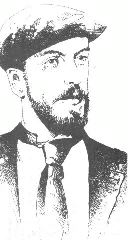20200710
注解: 手指向下或右滑,翻到下一页,向上或左滑,到上一页。
保尔-让·图莱

简介
保尔-让• 图莱(Paul-Jean,Toulet,1867—1920) ,幻想派诗人。其诗继承了魏尔伦、邦维尔、雅姆这一传统,写得极其精致,音韵柔和,他也像魏尔伦一样爱好使用单音节诗句。他特别注重节奏和词的音色。诗很简短,常常是每首诗只用两个或三个四行诗渗合组成,每句诗也只有六个或八个音节。他还在诗中加入现代民间语言,富于音乐感。他在诗中总是歌唱爱情、友谊、岛屿、鸦片、大海的正午、西班牙咖啡。卡尔科推崇他为幻想派诗人领袖。
Life and works
Paul-Jean Toulet was the son of a wealthy sugar planter, originally from Pau but living in Mauritius. He was most famous for his acerbic wit, his addiction to opium, and his friendship with Maurice Sailland - the "prince of gastronomes".
As a writer, Toulet is best known for Les Contrerimes, poems written in a verse form of his own invention, the rhyme scheme abba, with the lines alternating long, short, long, short. The collection was published posthumously, although many of the poems appeared in various literary magazines, either in earlier versions or finished forms (Toulet was an inveterate polisher of his verse).
His novels are almost unreadable today, with the possible exception of Mon amie Nane, a sort of fin-de-siècle equivalent to Pride and Prejudice , or even Bridget Jones' Diary.
Toulet became a model or an inspiration to the fantaisiste poetic movement from 1911 until the Great War. This explains the following comment made on the reception of his works: "When two men who have read Paul-Jean Toulet meet (usually in a bar), they immediately imagine it's a certain form of aristocracy".[1]
In 1897, Toulet received a copy of The Great God Pan by Arthur Machen from a friend and he translated it the following year, as Le Grand Dieu Pan. It was published in La Plume in 1901 but went unnoticed except for Maeterlinck's reaction "...combining the traditional and scientific fantastic genres, it hits both our memories and hopes". Toulet engaged a correspondence with Machen and visited him in London.
Toulet's own novel Monsieur de Paur, homme public was inspired by Machen. Published in 1898 by Simonis Empis, it saw little success. In 1918, however, it was published again by the Éditions du Divan. This publishing company was owned by Toulet's admirer Henri Martineau, who also engaged in a correspondence with the author.
Toulet died in Guéthary, Aquitaine, in September 1920.